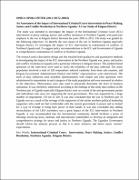| dc.description.abstract | OPIKA OPOKA PETER (2011-M172-20016)
An Assessment of the Impact of International Criminal Court Intervention in Peace Making, Justice and Conflict Resolution in Northern Uganda: A Case Study of Kitgum District.
The study was intended to investigate the impact of the International Criminal Court (ICC) intervention in peace making, justice and conflict resolution in Northern Uganda with particular emphasis to the war in Kitgum district between the years 2002 to 2012. The study was guided by the following objectives; To identify the root causes of the war in Northern Uganda especially Kitgum district; To investigate the impact of ICC intervention in containment of conflicts in Northern Uganda and; To suggest policy recommendations to the ICC and Government of Uganda in comprehensive containment of conflicts in Northern Uganda.
The research used a descriptive design and this entailed both qualitative and quantitative methods in investigating the impact of the ICC intervention in the Northern Uganda war, peace, and justice and conflict resolution in Uganda with a particular reference to Kitgum district. The predetermined questions of the interviews were used to verify the reliability of the data collected. The study population involved a total of 320 respondents selected randomly from three sub-counties, and Kitgum Government Administration District and NGOs‟ representatives were interviewed. The tools of data collection used included; Questionnaires with simple and clear questions were administered to respondents in each category of the study population and were answered in relation to the objectives. Observations were also used to physically determine the level of business operations. It was, therefore, understood according to the findings of this study that conflicts in the Northern part of Uganda especially Kitgum district were as a result of the anti-government parties and individuals who were not supporting the local government. This was supported by a large number of respondents 178 out of 320. It was also concluded that the war in Northern part of Uganda was as a result of the revenge of the supporters of the earlier northern political leadership supporters who could not feel comfortable with the current government in power and so looked for a way of revenge to bring back power in their hands. It was also concluded that tabling reconciliation of the LRA surrenders was a great impact of the ICC intervention in Northern Uganda. It was recommended that the international community should facilitate a series of meetings involving local, national, and international stakeholders to develop an integrated and comprehensive strategy for peace and justice in Northern Uganda. The Ugandan Government should reform the amnesty process so that it is more inclusive and better meets victims‟ expectations.
Key Words: International Criminal Court, Intervention, Peace Making, Justice, Conflict Resolution, Northern Uganda, Kitgum District. | en_US |


